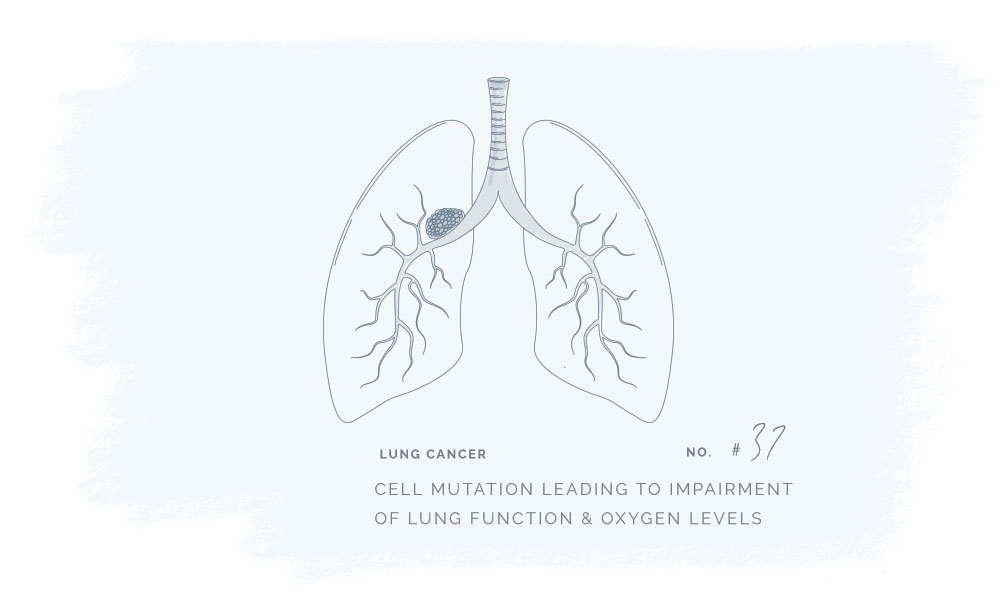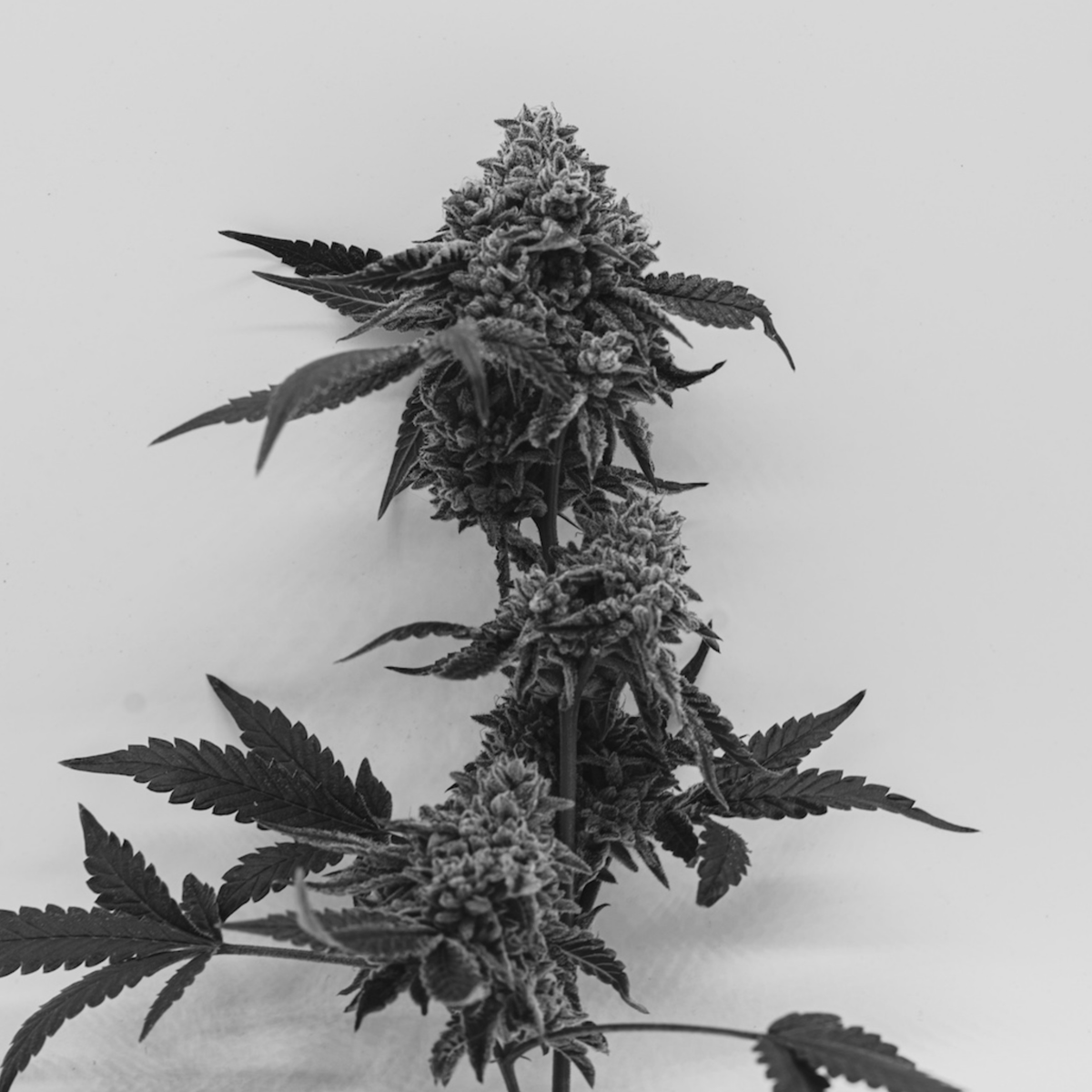
Lung Cancer
Cancer

What is Lung Cancer
Lung cancer involves the growth of abnormal cells in one or both lungs. Lung cancer cells contain mutations leading to uncontrollable cell division and growth. Similarly, it can spread and damage/destroy normal tissue. The abnormal cells can form tumors and cause problems with the function of the lung which is critical for providing oxygen to the body through the blood.
Statistically, lung cancer is the most deadly type of cancer worldwide.
Symptoms
Often, signs and symptoms of Lung Cancer do not appear until the disease is at an advanced stage.
The main symptoms of lung cancer may be:
- Lingering cough that may aggravate
- Coughing blood even very little
- Easily out of breath (shortness)
- Hoarseness
- Frequent chest infections (e.g. bronchitis and pneumonia)
- Unexplained headaches
- Unexpected weight loss
Cause
As other types of cancer, lung cancer involves the growth of abnormal cells containing mutations that lead to uncontrollable growth and cell division. It can spread and damage normal tissue. The main causes of lung cancer are:
- Smoking, both firsthand and secondhand smoke (the primary cause)
- Exposure to radon gas and/or asbestos and other carcinogens
- Previous radiation therapy
- Heredity
Lung cancer can be divided into 2 types
- Small cell lung cancer
Almost solely found in heavy smokers - Non-small cell lung cancer
An umbrella term for a group of lung cancers
Lung Cancer Symptoms
Lingering cough, bloody cough, hoarseness, frequent chest infections, and shortness of breath among others.
Therapeutic Potential
Preclinical data suggests CBD and THC among other cannabinoids may be therapeutic for Lung Cancer.
Application options
Depending on your needs, the optimal type of application may vary. Find more information on our application options.
The connection between Cannabinoids & Lung Cancer
Studies find that CBD and THC may have great therapeutic potential and may be used to help treat Lung Cancer. CBD and THC are well-known cannabinoids, however, they do not have the same psychoactive effects. THC is psychoactive while CBD does not possess psychoactive effects. According to WHO guidelines, the cannabidiol CBD is generally well tolerated with a good safety profile.
Preclinical data proposes that THC and CBD may be therapeutic in the treatment of lung cancer.
In a case report, it was shown that CBD may have been involved in producing positive effects in a patient with Lung Cancer. This striking response was seen after the patient self-administered CBD oil for one month. No other identifiable lifestyle, drug, or dietary changes could be found.
In addition, a recent study proposes that the cannabinoid receptors CB1 and CB2 may play a role in the survival of patients and can serve as potential markers for patient survival.

Literature Discussion
The literature discussion is an overview of the published results from scientific studies investigating if and how cannabinoids can be beneficial in the treatment of Psoriasis. The overview will be updated regularly to ensure the newest and most accurate information.
CBD may suppress cancer cell invasion, metastasis and induce death of cancer cells
CBD addition (1nM-3μM) to the lung cancer cell lines (A549, H358, and H460), upregulated ICAM-1 and TIMP-1 through TRPV1. In mice carrying human lung cancer xenografts, CBD presence caused a 2.6 and 3.0 fold increase of ICAM-1 and TIMP-1 protein, suppressing lung cancer cell invasion and metastasis.
In cancer cell lines (A549 and H460) and human metastatic lung cancer cells, it was shown that ICAM-mediated Lymphokine-Activated Killer cell adhesion and cancer cell lysis can be induced by CBD and THC.
In lung cancer cell lines (A549, H460) and human lung cancer cells, it was found that apoptotic cell death can be induced by CBD through COX-2 and PPARγ. Furthermore, in A549-xenografted nude mice, it was shown that tumor regression can be caused by CBD.
Clinical Trials
Clinical trials are research studies that examine new treatments and evaluate their effects on human health outcomes.
Today, we are not able to provide any clinical trials about cannabinoids and Lung Cancer.
Cannabinoids & Receptors
Below you find the plant cannabinoids, cannabinoid receptors, and endocannabinoids that are associated with the potential therapy.
CBD
Cannabidiol (CBD) is a dominant cannabinoid in hemp. CBD does not possess psychoactive effects and does not make people high. CBD has been demonstrated to have potential as an alternative for several health-related conditions, including anxiety, pain, depression, among others.
THC
Tetrahydrocannabinol (THC) is a cannabinoid found in the cannabis plant. THC possesses psychoactive properties.
CB2
Cannabinoid receptors are located on the surface of cells in your body and they “listen” to conditions outside the cell. CB2 receptors are key players in the ECS. CB2 receptors are more abundant outside the nervous system, including cells of the immune system.
If you have any further information relevant to the connection between Lung Cancer and cannabinoids or find any of the information inaccurate, outdated or incomplete please contact us here
References
- https://www.lungcancer.org/find_information/publications/163-lung_cancer_101/265-what_is_lung_cancer
- https://www.statista.com/statistics/288580/number-of-cancer-deaths-worldwide-by-type/
- https://www.mayoclinic.org/diseases-conditions/lung-cancer/symptoms-causes/syc-20374620
- https://ghmedical.com/endocannabinoid-system/diseases/lung-cancer-0
- Suso, J., Et Al., (2019).” Striking lung cancer response to self-administration of cannabidiol: A case report and literature review”. https://www.ncbi.nlm.nih.gov/pmc/articles/PMC6385325/
- Milian, L., Et Al., (2020).“Cannabinoid receptor expression in non-small cell lung cancer. Effectiveness of tetrahydrocannabinol and cannabidiol inhibiting cell proliferation and epithelial-mesenchymal transition in vitro”. https://www.ncbi.nlm.nih.gov/pmc/articles/PMC7015420/
- Ramer, R., Et Al., (2012). “Cannabidiol inhibits lung cancer cell invasion and metastasis via intercellular adhesion molecule-1”. https://faseb.onlinelibrary.wiley.com/doi/full/10.1096/fj.11-198184
- Haustein, M., Et Al., (2014). “Cannabinoids increase lung cancer cell lysis by lymphokine-activated killer cells via upregulation of ICAM-1”. https://www.sciencedirect.com/science/article/abs/pii/S0006295214004201?via%3Dihub
- Ramer, R., Et Al., (2013). “COX-2 and PPAR-γ Confer Cannabidiol-Induced Apoptosis of Human Lung Cancer Cells”. https://mct.aacrjournals.org/content/12/1/69
